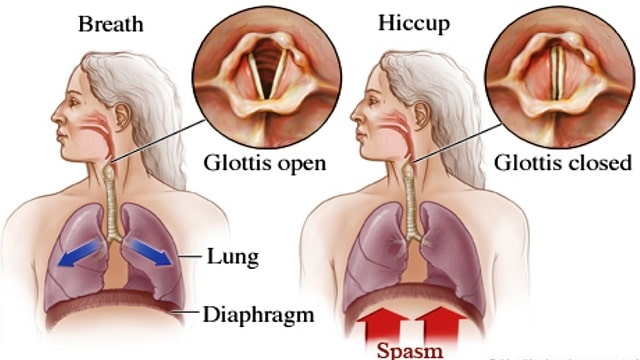What Are Hiccups?
Both adults and babies have experienced hiccups or singultus.
Hiccups, which are characterized by a chik sound, occur when the diaphragm, or muscle membrane that separates the chest cavity and abdominal cavity, contracts.
Each contraction that occurs in the organ will have an important role in breathing and cause the vocal cords to close suddenly, thus producing the characteristic sound of hiccups.
Symptoms of Hiccups
Hiccups that last a long time can also be an indication of a serious illness.
For this reason, if an examination is carried out by a doctor, there are several tests that may be carried out, such as:
- Endoscopy. This examination using a small tube equipped with a light and camera is performed if hiccups are suspected to be related to digestive disorders, such as acid reflux disease or gastroesophageal reflux (GERD).
- Electrocardiogram (ECG). This test measures the electrical activity in the heart if hiccups are suspected to be related to heart problems.
- X-ray scans. Computerized tomography scans, or CT scans, and magnetic resonance imaging (MRI) scans. Any of these three scans may be done if your doctor suspects your hiccups are caused by an infection or tumor.
- Blood tests. This test is done if the hiccups are suspected to be caused by liver, kidney, or diabetes problems.
Causes of Hiccups
Generally, hiccups last only a few minutes, so there is no need to worry.
Brief hiccups can be triggered by:
- Hot drinks.
- Soft drink.
- Alcoholic beverages.
- Eating spicy food.
- Eating too fast.
- Smoke.
- Stress, fear, or joy.
- Bloated stomach.
In some cases, hiccups can also last a long time, namely more than two days.
Usually, hiccups like this are caused by health problems, including:
- Metabolic disorders, such as hypoglycemia, hyperglycemia, and diabetes.
- Vagus nerve disorders, for example due to meningitis, pharyngitis, and mumps.
- Nervous system disorders, such as severe brain injury, inflammation of the brain tissue or encephalitis, tumors, and stroke.
- Respiratory disorders, such as pleurisy, pneumonia, and asthma.
- Psychological reactions, such as stress, joy, sadness, fear, or shock.
- Digestive disorders, such as intestinal obstruction, colitis, and gastroesophageal reflux disease (GERD).
Hiccups that last a long time can also be caused by taking medications, such as:
- Chemotherapy drugs for cancer treatment.
- Opioid or pain reliever drugs.
- A sedative to treat anxiety.
- Preoperative anesthesia.
- Medicine for hypertension.
- Anticonvulsant medication.
- Medicines to treat swelling and inflammation.
Risk Factors for Hiccups
Factors that can increase the risk of hiccups:
- Gender. Men are more likely to develop long-term hiccups than women.
- Mental or emotional problems. Anxiety, stress, and excitement are often associated with some cases of short-term or long-term hiccups.
- Some people develop hiccups after undergoing general anesthesia or after procedures involving the abdominal organs.
Diagnosis of Hiccups
First of all, a neurological examination to measure reflexes, general coordination and balance, ability to feel touch, muscle tone and strength, and vision.
If the cause of hiccups is suspected to be a health disorder, further examination is necessary.
One of them is a blood test to detect signs of infection, kidney disease, or diabetes.
Complications of Hiccups
Complications from hiccups are rare, but when they occur they can cause discomfort in carrying out daily activities.
You may also experience difficulty eating, gastroesophageal reflux, respiratory alkalosis (in tracheostomy patients), wound dehiscence (reopening of the surgical wound), sleep deprivation, and mental health problems.
Hiccups Treatment
If not caused by symptoms of a serious illness, hiccups can be treated in the following ways:
- Get into a prone position to press your chest to the floor.
- Lie or sit while pulling your knees up to touch your chest.
- Breathing in a bag made of paper.
- Taste of vinegar.
- Swallow granulated sugar.
- Biting a lemon.
- Holding your breath for a relatively short period of time.
- Drink cold water slowly.
If hiccups last a long time without a known cause or if they do not improve within 48 hours, consult a doctor immediately.
Hiccups Prevention
When consuming drinks and food, it is best to do so slowly.
However, if the hiccups are caused by emotional conditions, nervousness, or stress, you should take a deep breath and try to calm yourself down, so that the hiccups go away.

